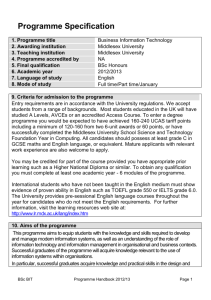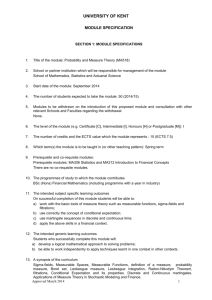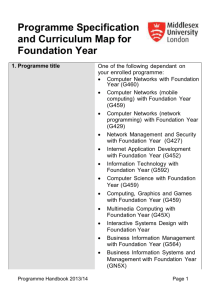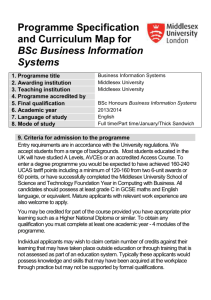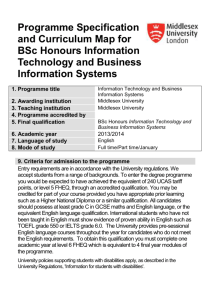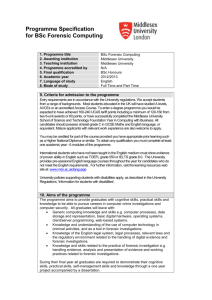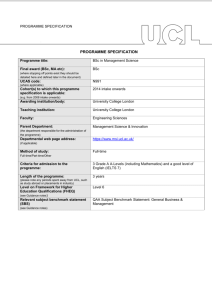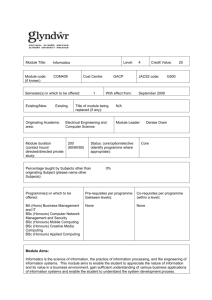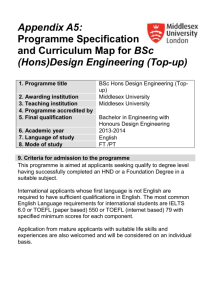Business Information Systems & Management
advertisement
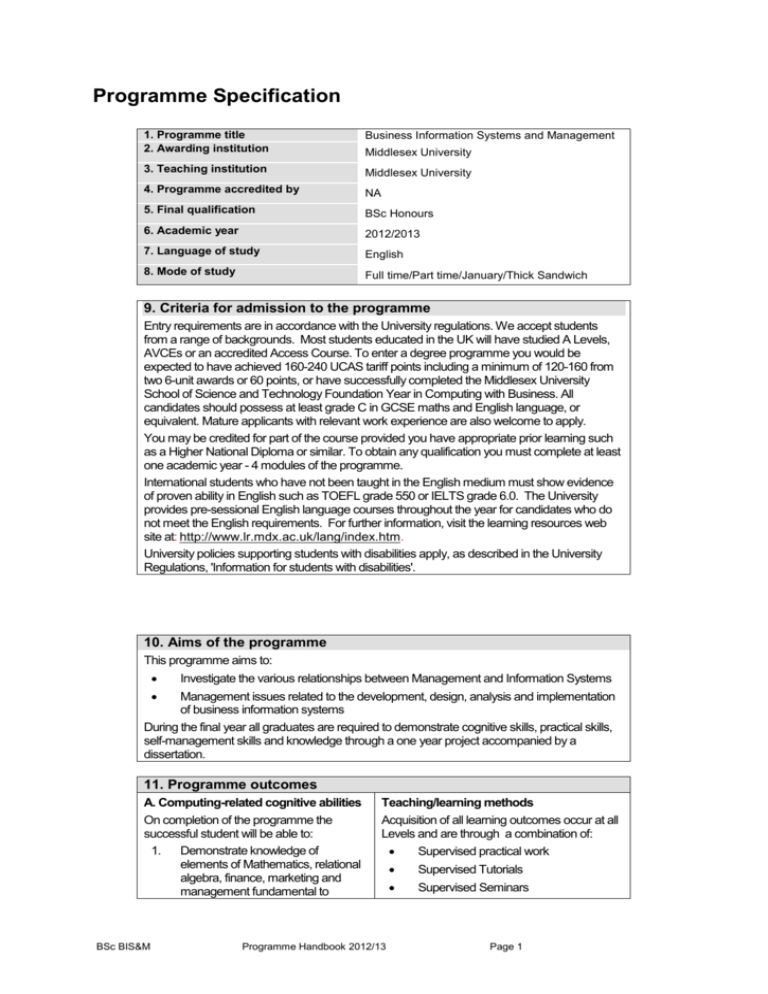
Programme Specification 1. Programme title 2. Awarding institution Business Information Systems and Management 3. Teaching institution Middlesex University 4. Programme accredited by NA 5. Final qualification BSc Honours 6. Academic year 2012/2013 7. Language of study English 8. Mode of study Full time/Part time/January/Thick Sandwich Middlesex University 9. Criteria for admission to the programme Entry requirements are in accordance with the University regulations. We accept students from a range of backgrounds. Most students educated in the UK will have studied A Levels, AVCEs or an accredited Access Course. To enter a degree programme you would be expected to have achieved 160-240 UCAS tariff points including a minimum of 120-160 from two 6-unit awards or 60 points, or have successfully completed the Middlesex University School of Science and Technology Foundation Year in Computing with Business. All candidates should possess at least grade C in GCSE maths and English language, or equivalent. Mature applicants with relevant work experience are also welcome to apply. You may be credited for part of the course provided you have appropriate prior learning such as a Higher National Diploma or similar. To obtain any qualification you must complete at least one academic year - 4 modules of the programme. International students who have not been taught in the English medium must show evidence of proven ability in English such as TOEFL grade 550 or IELTS grade 6.0. The University provides pre-sessional English language courses throughout the year for candidates who do not meet the English requirements. For further information, visit the learning resources web site at: http://www.lr.mdx.ac.uk/lang/index.htm. University policies supporting students with disabilities apply, as described in the University Regulations, 'Information for students with disabilities'. 10. Aims of the programme This programme aims to: Investigate the various relationships between Management and Information Systems Management issues related to the development, design, analysis and implementation of business information systems During the final year all graduates are required to demonstrate cognitive skills, practical skills, self-management skills and knowledge through a one year project accompanied by a dissertation. 11. Programme outcomes A. Computing-related cognitive abilities On completion of the programme the successful student will be able to: 1. Demonstrate knowledge of elements of Mathematics, relational algebra, finance, marketing and management fundamental to BSc BIS&M Teaching/learning methods Acquisition of all learning outcomes occur at all Levels and are through a combination of: Programme Handbook 2012/13 Supervised practical work Supervised Tutorials Supervised Seminars Page 1 business 2. Differentiate and relate to Management and organisational behaviour and function 3. Identify the benefits of strategic alignment in an organisation and the competitive advantage that can be gained from this alignment 4. Make effective choices among various approaches in Analysis, Design and Implementation of Business Information Systems 5. Identify the professional issues (e.g. legal, social, ethical and cultural) and the critical attributes of managing successful IT projects in the development and appreciation of business information systems 6. Use appropriate models for problem solving relevant to the system under development, and select suitable tools to generate solutions to problems in system development Research and present, in writing, rational and reasoned arguments that address a range of situations relating to IS and examine the impact of new technological innovations and how they may be managed B. Computing-related practical abilities On completion of the programme the successful student will be able to: 1. Identify the different roles in the management of projects and business operations 2. Manage the development and application of business information systems, including elements of communication, documentation, marketing, finance, people and technology 3. Participate and communicate at all Levels of IT Project Management 4. Harness business information systems to support decision-making within an organisation Specify, design, implement and evaluate business information systems BSc BIS&M Guided and individual research Coursework assignments Lectures Project work Case Studies Formative and summative assessment and feedback on assignments Online Discussion Boards Reading Assessment Assessment of all learning outcomes occur at all Levels and are through a combination of: Informal group work during Supervised Tutorials, Seminars or Labs Essays Presentations On-line quizzes Coursework Individual and group work Essays Lab exercises Unseen examinations Teaching/learning methods Acquisition of all learning outcomes are through a combination of: Closely supervised laboratories and various exercises Encouragement to raise questions and be open minded to suggestions from other team members when seeking solutions to practical solutions Supervised Seminars Lectures Modelling Coursework Presentations Essays Online Discussion Boards Reading Assessment Assessment of all learning outcomes are through a combination of: Programme Handbook 2012/13 Coursework Unseen examinations Practical laboratory tests Online quizzes Page 2 C. Additional Transferable Skills On completion of the programme the successful student will be able to: 1. Demonstrate effective information retrieval skills from appropriate primary research sources, e.g. ecatalogues, and be able to cite and reference sources appropriately 2. Apply numeric skills: involving analysis and presentation of quantitative data 3. Effectively manage tasks independently and as part of a team 4. Prepare for continued professional development and life-long learning in a business/organisation 5. Communicate effectively via presentations and reports Participate at all Levels of IT Project Management and develop interpersonal skills. Modelling IS Case Studies Group Assignments Documentation Essays Lab and Seminar Exercises Lab and Seminar Tests Appropriate use of Case tools for analysis and design Teaching/learning methods Acquisition of learning outcomes C1 and C2 will occur at Level 1. Acquisition of learning outcomes C3 will occur in Levels 2 and 3. Acquisition of learning outcomes C4 will occur in Level 3. Acquisition of learning outcomes C5 and C6 occur at Levels 1 and 3. Acquisition of all learning outcomes will be through a combination of: Supervised practical work Supervised Tutorials Supervised Seminars Guided and individual research Coursework assignments Lectures Group work Open-ended practicals Project work Formative and summative assessment and feedback on assignments Online Discussion Boards Reading Assessment Assessment of learning outcomes C1 and C2 will occur at Level 1. Assessment of learning outcomes C3 will occur in Levels 2 and 3. Assessment of learning outcomes C4 will occur in Level 3. Assessment of learning outcomes C5 and C6 occur at Levels 1 and 3. Assessment of all learning outcomes will be through a combination of: BSc BIS&M Programme Handbook 2012/13 Coursework and Project work Unseen examinations Online quizzes Modelling IS Case Studies Group Assignments Documentation Essays Lab and Seminar Exercises Page 3 Lab and Seminar Tests Dissertation Appropriate use of generic IT software to produce and present information e.g. spreadsheets, documents, etc. 12. Programme structure (levels, modules, credits and progression requirements) 12. 1 Overall structure of the programme The programme is studied in four modes: Three years full-time; 100% university based Four years full-time thick sandwich; after completing years 1 and 2 at university, year 3 is full-time industrial placement then return in fourth year to university. Therefore, 25% industry and 75% university based Four to six years part-time; 100% university based Four years full-time with Foundation degree; 100% university based. On completion of Level 0 in first year the student can continue in any of the options above. The programme is undertaken at Levels 4, 5 and 6, where a Level is equivalent to one year of full-time study. The delivery of each Level is completed over 2 terms; Autumn and Winter. Each Level is composed of the delivery of four modules each worth 30 credits, totalling 120 credits for each Level and thus giving a grand total of 360 credits for the entire programme. All modules are compulsory i.e. there are no options. 12.2 Levels and modules Starting in academic year 2010/11 the University is changing the way it references modules to state the level of study in which these are delivered. This is to comply with the national Framework for Higher Education Qualifications. This implementation will be a gradual process whilst records are updated. Therefore the old coding is bracketed below. Level 4 (1) COMPULSORY Students must take all of the following: PROGRESSION REQUIREMENTS To progress to Level 2 students are expected to achieve 120 Level 1 credit points BIS1200: Database Management Systems BIS1212: Introduction to Business Computing HRM1100: Understanding People in Organisations MKT1112: Principles of Marketing Level 5 (2) COMPULSORY BSc BIS&M PROGRESSION REQUIREMENTS Programme Handbook 2012/13 Page 4 Students must take all of the following: To progress to Level 3 students are expected to achieve at least 90 Level 2 credit points BIS2212: Database Systems – Design and Online BIS2311: Object Oriented Analysis and Design MGT2110: Operations Management MGT2530: Strategic Business Environment Level 6 (3) COMPULSORY Student must take all of the following: PROGRESSION REQUIREMENTS BIS3324: Strategic Management and Information Systems BIS3328: Social, Professional and Ethical Issues in IS MGT3130: Innovation and Technology Management Students are expected to achieve 120 credit points at Level 3 to complete their programme and achieve 360 credit points overall. This will qualify students with the award of BSc Business Information Systems and Management MGT3125: Project Management 12.3 Non-compensatable modules (note statement in 12.2 regarding FHEQ levels) Module level Module code All modules are subject to University Regulations 13. A curriculum map relating learning outcomes to modules See Curriculum Map attached 14. Information about assessment regulations BSc BIS&M Information on how the University formal assessment regulations work, including details of how award classifications are determined, can be found in the University Regulations at www.mdx.ac.uk/regulations/ Practical aspects of the programme are often assessed via coursework that may be carried out using specialist software and may include lab tests Programme Handbook 2012/13 Page 5 Theoretical material is assessed by coursework and examinations Grades are awarded on the standard University scale of 1–20, with Grade 1 being the highest. To pass a module all components, both coursework and examination, must be passed individually with a minimum grade of 16. Failure in one of the components will result in the failure of the module For additional information on assessment and how learning outcomes are assessed please refer to the individual module narratives for this programme. 15. Placement opportunities, requirements and support (if applicable) All Undergraduate students have the opportunity to go on Industrial Placement. Industrial Placements are encouraged as this valuable experience enhances a student’s future career prospects. Additionally students normally achieve better results in their final year. In brief: The placement provides a years experience as an appropriately paid graduate trainee Industrial placement is conditional on the successful completion of all modules at Level 1 and Level 2, therefore students need 240 credits before they are able to embark on an industrial placement Obtaining a placement is co-ordinated through the Employability and Careers Centre For Undergraduate programmes, students wishing to undertake a placement position must register for CMT3355 Each placement will be assigned to an industrial tutor who will visit the student on placement On graduation the degree will be qualified with the term “…with approved industrial experience” The placement option is not available to direct-entry students in their final year 16. Future careers: how the programme supports graduates’ future career development (if applicable) All programmes in the School of Computing Science – their curricula and learning outcomes – have been designed with an emphasis on currency and the relevance to future employment. The majority of graduates are employed in IT posts relevant to the subject Over 20% of students pursue further postgraduate study or research The employer links with the School are encouraged in a number of ways e.g. by inviting practitioners from industry as guest speakers in lectures; through links with companies where students are employed as part of their Industrial placement and through alumni both in the UK and overseas. 17. Particular support for learning (if applicable) The School’s Teaching and Learning Strategy is compliant with those of the University, in seeking to develop learner autonomy and resource-based learning. In support of the students learning experience: BSc BIS&M All new students go through an induction programme and some have early diagnostic numeric and literacy testing before starting their programme. Learning Resources (LR) provide workshops for those students needing additional support in these areas. Students are allocated a personal email account, secure networked computer storage and dial-up facilities Soft copies of all module handbooks can be found on My UniHub. Webbased learning materials are provided to further support learning Extensive library facilities are available on campus. WebCT pages are available as learning resources through My UniHub Students can access advice and support on a wide range of issues from the Programme Handbook 2012/13 Page 6 UniHelp Desk. Placements are supported by the Employability and Careers Centre. High quality specialist laboratories equipped with industry standard software and hardware where appropriate, for formal teaching as well as self-study Access to campus based teaching and learning support drop in sessions, arranged by the school to provide assistance and guidance Tutorial sessions for each module organised for groups of up to 20 students are provided for additional teaching support Formative feedback is given on completion of student coursework Past exam papers with solutions and marking schemes for all modules are available for students in module handbooks and at http://unihub.mdx.ac.uk Research activities of academic staff feed into the teaching programme, which can provide individual students with ad-hoc opportunities to work with academics on some aspect of research Middlesex University encourages and supports students with disabilities. Some practical aspects of School of Science and Technology programmes may present challenges to students with particular disabilities. You are encouraged to visit our campuses at any time to evaluate facilities and talk in confidence about your needs. If we know your individual needs we’ll be able to provide for them more easily. For further information contact the Disability Support Service (email: disability@mdx.ac.uk) 18. JACS code (or other relevant coding system) 19. Relevant QAA subject benchmark group(s) G500 Computing 20. Reference points The following reference points were used in designing the programme: QAA Computing subject benchmark statement QAA Framework for Higher Education Qualifications in England, Wales and Northern Ireland QAA/QAAS guidelines for programme specifications QAA Code of Practice for the assurance of academic quality and standards in HE University’s Regulations Module Narratives Middlesex University and School of Science and Technology Teaching Learning and Assessment policies and strategies University policy on equal opportunities. 21. Other information Middlesex University has formal links with 250 institutions world-wide, including student exchange agreements with more than 100 institutions. Currently a number of students both from the UK/EU and overseas take part in such exchanges. For further details please visit http://www.europe.mdx.ac.uk/ Please note programme specifications provide a concise summary of the main features of the programme and the learning outcomes that a typical student might reasonably be expected to achieve if s/he takes full advantage of the learning opportunities that are BSc BIS&M Programme Handbook 2012/13 Page 7 provided. More detailed information about the programme can be found in the student programme handbook and the University Regulations. BSc BIS&M Programme Handbook 2012/13 Page 8
